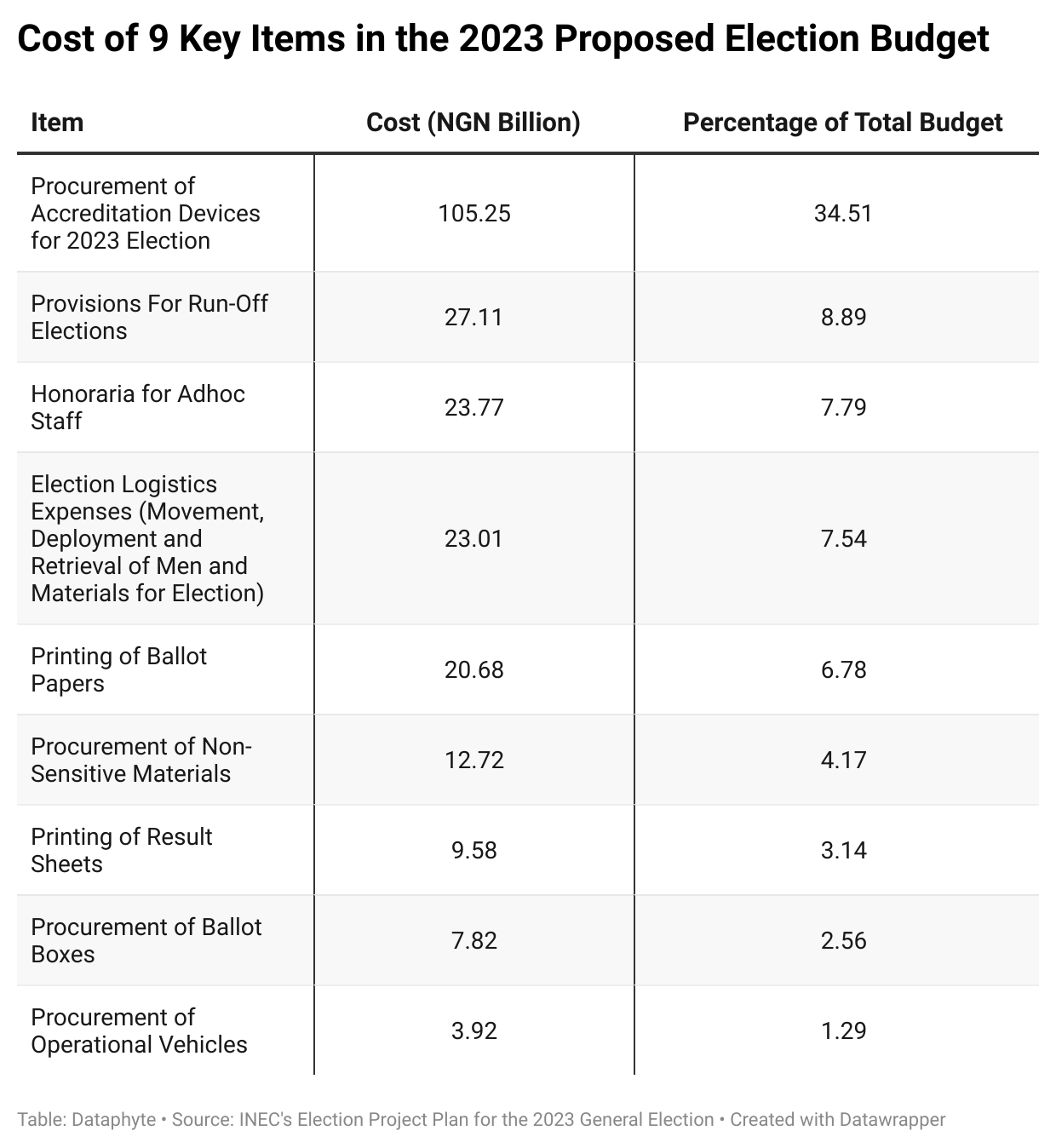The Independent National Electoral Commission (INEC) has proposed the sum of N305 billion for the conduct of the 2023 general election. This was revealed in the Commission’s Election Project Plan (EPP) document for the 2023 general election.
On Saturday, February 25, 2023, Nigerians will go to the polls to elect a new president. To effectively carry out this exercise, the EPP Committee has stated that INEC will need N305 billion to conduct the 2023 general election. This proposed figure was reached by the EPP Committee following a review of the budget proposals submitted by the 23 Departments and Directorates of the electoral commission.
Across the world, conducting elections is expensive, and the cost in each country is determined by certain factors and electoral events — some of which include the structure and size of the democracy, country population, and frequency of elections. Thus, globally, the average Cost per Registered Voter Index (COVI) is used to determine the adequacy of election funding. For established and stable democracies, the average cost per voter is pegged at $1 to $3. In transitional democracies, it ranges from $4 to $8, while the cost is fixed at $9 and above in post-conflict and some transitional democracies. In effect, elections tend to be more costly in nascent democratic countries.
Following the COVI, INEC has put the cost per voter for the 2023 election at an estimate of $5.39, with a target of 100 million registered voters for the election. Using the N565 to $1 parallel market exchange rate the Commission quoted in its EPP document, the actual figure is N304.54 billion. However, the figure is pegged at N305 billion.
This figure is a 61.37% increase over what was spent to conduct the 2019 general election. INEC spent N189.2 billion to conduct the last general election. The cost per voter was fixed at $6.24 at an exchange rate of N305 with a total of 84 million registered voters.
In real terms, the cost per voter for the 2023 election reduced compared to 2019 ($5.39 against $6.24 in 2019), only that the exchange rate has skyrocketed since the last general election. In addition, the increase in the number of registered voters — one of the determinants for planning election budgets — and the creation of 56,873 new polling units, among others, may also account for the increase in the proposed budget for the 2023 election.
An analysis of the 2023 proposed election budget shows that 9 items account for 76.68% of the total budget. Procurement of accreditation devices will take the bulk — 34.51% of the entire budget, while provision for run-off elections is 8.89% of the budget. Honoraria for adhoc staff, logistics, and printing of ballot papers cover 7.79%, 7.54%, and 6.78% respectively.

On funding the 2023 election budget, INEC explained the Federal Government will provide the required funds for the Commission to cover the fixed and direct costs of elections. INEC further explained that although it is not reflected either in the fixed budget of the Commission or in the core costs for the conduct of elections, it will also receive support from development partners for some of its electoral activities such as training, capacity building, civic and voter education, production of information, education and communication materials, and engagement with stakeholders which are all geared towards strengthening the integrity of the electoral process, promoting citizens’ participation, and enhancing advocacy for inclusivity with reference to women, youths, persons with disability and other marginalised groups.
As the Federal Government, INEC, and other relevant stakeholders set things in place for the general election, beyond mere election funding, another point to pay critical attention to is ensuring that more people turn out to vote in the upcoming election so as to avoid another waste of funds, as witnessed in the last 3 general elections.
Last year, Dataphyte reviewed the country’s election expenses and noted that while the Federal Government spent N444.5 billion to conduct the country’s last three general elections a total of N255 billion was wasted due to the low voter turnout recorded in each of the elections.
Among other things, the electoral Commission uses the voter register, that is, the number of people who have registered for an election, as a basis for election planning. Thus, in the 2011 general election, INEC spent N139 billion at the average cost of N1,893 or $9 per voter for the 73.5 million registered voters.
For the 2015 elections, N116.3 billion was spent at the rate of N1,691 or $8.5 per voter for the 68.9 million citizens who had registered prior to the election funding stage. In 2019, the number of registered voters stood at 84 million, and 189.2 billion was spent to conduct the election.
However, in all these elections, except for 2011, more than half of the registered voters did not turn out to vote on the election day which accounts for the N255 billion waste since INEC relies on the number of registered voters to plan election budgets.
In the last general election, only 34.75% of the 84 million registered voters came out to vote. The lowest turnout recorded in Africa in 2019 and Nigeria’s lowest since its return to democracy in 1999.

Now, for the 2023 election, INEC has projected 100 million registered voters; proposing N305 billion to conduct the election. With the country’s declining voter turnout rate, the possibility of a huge waste of funds is quite concerning. To prevent another situation of huge resources going to waste as a result of lower voter turnout, the electoral commission may need to adopt workable measures to ensure more participation at the 2023 polls.

.webp)


